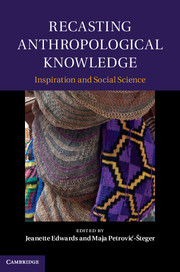Book contents
- Frontmatter
- Contents
- Contributors
- Acknowledgements
- 1 Introduction
- 2 Writing the parallax gap
- 3 Too big to fail
- 4 ???Hybrid custom??? and legal description in Papua New Guinea
- 5 Entomological extensions
- 6 Kinship and the core house
- 7 Invisible families
- 8 Knowledge in a critical mode
- 9 Spools, loops and traces
- 10 Inspiring Strathern
- Bibliography
- Index
10 - Inspiring Strathern
Published online by Cambridge University Press: 07 September 2011
- Frontmatter
- Contents
- Contributors
- Acknowledgements
- 1 Introduction
- 2 Writing the parallax gap
- 3 Too big to fail
- 4 ???Hybrid custom??? and legal description in Papua New Guinea
- 5 Entomological extensions
- 6 Kinship and the core house
- 7 Invisible families
- 8 Knowledge in a critical mode
- 9 Spools, loops and traces
- 10 Inspiring Strathern
- Bibliography
- Index
Summary
In this chapter, I want to explore what it might mean, as an anthropologist, to claim an intellectual debt. How should one properly recognise the influence of the ideas of another? What is the correct register for acknowledging that person and demonstrating the effect of his or her work? Although the form of these questions is generalised, of course a properly anthropological response must involve a turn to the particular. In short, I need an example to work through and direct my answer. My choice will be necessarily reflexive; it’s hard to contemplate writing about the dynamics of intellectual debt and influence without first considering one’s own experience. Specifically, I wish to investigate the authority of my original teacher, Marilyn Strathern; to embrace that relationship and make it part of the ethnographic record. So here I am the chief subject who claims to be the recipient of ideas. In what follows, I want to examine the outcomes of identifying that my work has been shaped by someone else.
But I also need an analytical category that illustrates the connection, makes it come alive or reveal itself. In traversing the example, analysing the narrow and broader influence of Strathern, I choose to evoke the familiar idiom of inspiration. The term appeals to me for a number of reasons. First of all it is not quite conventional. Anthropologists, including Strathern, would readily recognise the claim that a person or work can be inspiring but it is not one they typically draw upon in anthropological writing. Secondly, the choice reflects one of my own fieldwork positionings: a student of Papua New Guinea societies who ends up studying English literary culture, personhood and kinship. For me inspiration is not just an analytical category, it is also an ethnographic one. A further part of its appeal lies in the fact that it is conspicuously not Melanesian. However, at the same time it could be. Indeed, I wish to see what happens to the category when we reroute it through the Melanesian sociality described by Strathern and what happens to that when we reroute it back through Euro-American models of inspiration. Of course this zigzagging strategy also reflects the classic deployments of Strathern; in her work the logic and imagination behind our responses to new reproductive technologies or intellectual property rights, for instance, are thrown into relief by practices and ideas reported from Papua New Guinea and vice versa. Most characteristically of all, she does not just present an analysis or description; she performs it. With all this in mind, what I want to know is what exactly it means to do inspiration, to actively assert and show that ‘I am inspired by Strathern.’
- Type
- Chapter
- Information
- Recasting Anthropological KnowledgeInspiration and Social Science, pp. 165 - 182Publisher: Cambridge University PressPrint publication year: 2011
- 3
- Cited by



